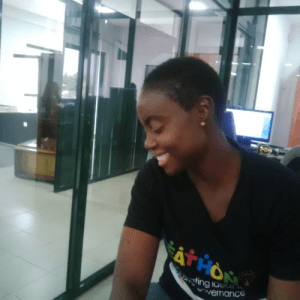Having a baby is usually considered to be one of the happiest periods of a woman’s life especially in Nigeria where there is so much emphasis on childbearing by women. However, there is a dark side to this natural phenomenon. Having babies is not such a happy time for some women who experience negative emotions which makes it difficult to take proper care of their babies or themselves. These feelings according to the World Health Organisation (WHO) is called Postpartum Depression (PPD). Correspondent Emiene Erameh takes us through what PPD is, and how it affects women and their families.
When Vanessa had her first child, she said she was over overjoyed. This feeling, however, did not last as it soon gave way to feelings of inadequacy. She said the baby she had waited so long to have started to annoy her.
Vanessa:
I was really depressed, at times I will quarrel with my husband, at times my baby will cry, I will not even…I said han-han, why is it like this? I am supposed to be happy to be a mother, why am I depressed. Ad when you tell people they feel like, are you the first mother, you are not even happy, you don’t even thank God. Who says I am not happy, but there are times when you need people around. I don’t know, I don’t even know how to express it, maybe probably if my stepmother was still around I probably would have felt better. But at that time I would be alone from morning till evening struggling to do things I am not used to, I am just learning. It was really, really… My husband, when he comes he helps but that period he is not around that it is just me and our son, it was really depressing. At times my son will cry, it is my neighbor, ah what is happening, eeyah, sorry do this, do this one like this and I will start crying. What is it, why did my stepmom leave like that, maybe I would have stayed at her place. When I need rest, when I am supposed to rest one baby is crying, at times, I used to lie down, he will cry for a long time, I will just drag myself, which kind of wahala is this?
The World Health Organisation says about 20% of mothers in developing countries experience depression after childbirth.
Postpartum depression according to the US National Institute of Health website is a mood disorder that can affect women after childbirth. Mothers with postpartum depression experience feelings of extreme sadness, anxiety, and exhaustion that may make it difficult for them to complete daily care activities for themselves or for others.
What causes postpartum depression?
Postpartum depression does not have a single cause, but likely results from a combination of physical and emotional factors. Postpartum depression does not occur because of something a mother does or does not do.
Because Vanessa had no idea what was wrong with her she did not know how to deal with it or where to get help.
Vanessa:
Our medical services here, in this part of the world when you go to the hospital you want to talk to the doctors the doctors will make it seem as if they know everything as we are different people, we have different experiences even someone that has malaria, the experience the person will have will be different from another person’s experience.
When you go to the hospital at times you won’t finish explaining yourself, they will just jump into conclusion. for instance, I went for a checkup for them to check me although they asked me questions. But, in my experience with medical personnel, they don’t take us seriously, it seems they neglect us, because when you go to the hospital the normal thing that should be done is that doctors and nurses should try to be friendly and nice to you, but here they think they are doing you a favor.
The US National Institute of Health says only a health care provider can diagnose a woman with postpartum depression. Because symptoms of this condition are broad and may vary between women, a health care provider can help a woman figure out whether the symptoms she is feeling are due to postpartum depression or something else.
A psychiatrist Dr. Julia Ogwunga said it is important for new mothers to access care as this will reduce the negative consequences on the family.
Dr. Julia Ogwunga:
That’s because they don’t understand, that’s what I am saying. They believe that depression is under the woman’s control, but that is not true. This is an illness. So it is important that the family knows that this is an illness. It is not a thing the woman made up, it’s not a thing she can shake off. She needs treatment. One of the support aspects is part of it, then, of course, the treatment, there is a need for her to get medication, there is also the need for her to have psychological treatment all these things will help her come out of it.
The WHO recommends that at each postnatal contact with health workers, mothers should be asked about their emotional wellbeing, what family and social support they have and their usual coping strategies for dealing with day-to-day matters.
But post-natal contact with Health care workers is few and far between in Nigeria and in the FCT. The Multiple Indicator Cluster Survey 2017 done by the National Bureau of Statistics puts the percentage who received a postnatal visit by health personnel at 37.1 percent. According to the survey, 91 percent of women who give birth in the FCT get no post-natal care visit.
And to compound matters, an official with the Health Management Board Dr. Frank Alu confirmed that the FCT has no policy in place to tackle PPD.
Women are told what to expect during pregnancy and delivery while undergoing their ante-natal but not much is said about how to deal with issues that arise after delivery.
Esther another woman who suffered PPD said she was completely overwhelmed after having a baby via Cesarean Section and had serious difficulty coping after she had her first son.
Esther:
When we came back home, the main thing now started, the midnight sleepless nights, you know, they have to cry, you have to breastfeed. At a point I was kind of angry, you know I felt this anger inside of me, but my Mum would say enh, it would pass you would get used to it. It got to a point that getting pregnant again was scary. I was not relishing it again to get pregnant again, but when she got her first month, the crying subsided, I know what to do then because my Mum came.
Jacinta had twins who were born prematurely at seven months. After delivery, she was discharged, but her babies were in the incubator and so she had to remain in the hospital with them. But there was no place to sleep and so she had to sleep on the floor of the hospital until they were discharged. She said she struggled intensely to cope after she got home, but was forced to keep her feelings to herself as she did not think her husband or anyone else would understand.
Jacinta:
Because you don’t even know there is something to talk about. It is not like the problem is staring at you in the face, but there is a problem. You know sometimes, I wake up at night and I am like why did these children even come. If I had someone, it is not proper for you to tell your husband something like that, before something happens to the baby and the next thing they brand you a murderer or something like that. But if I had a professional to talk to then, I believe that the profession would have understood where I was coming from. It was that I hated the children but sometimes you just get tired, frustrated more like.
Work-life balance is a challenge for a lot of mothers in Nigeria and Jacinta said the challenges became even worse because she was entitled to 3 months maternity leave since she worked in a private organization and she said she did not feel she was giving her best at work because she often worried about her children who were still very young while she was at work.
Dr. Ogwunga who acknowledged that there are no special centers to deal with PPD, however, recommends that preventive measures can begin while a woman is pregnant.
Dr. Ogwunga:
Prevention really starts in the moments when the woman is pregnant because some of these things are stressors that come from the pregnancy and are factors such as environmental factors and genes. But if she the woman can have help and support from her partner and mother, because they are some of the good things we have in our culture when a woman has a baby and her mother is there to help and take care of the mother and baby and also help in cooking it helps the woman by making sure she rest well and gets enough food then prevention is sure.
Jacinta who said it is okay to talk about preventive measures, however, noted that the attitude of health workers may make it difficult to achieve.
Jacinta:
You know all the news you hear about nurses it actually happened to me. You know, they were not eager to attend to me, maybe because I was not crying and rolling on the floor if you are in labor you don’t need to tell us we will know.
These experiences contradict the usual narrative especially in Nigeria that having a baby is the best thing that ever happened to every new mother. This sadly may not be the truth, however as these stories illustrate the fact the postpartum depression which is what these women exhibited symptoms of, is a very serious ailment.
Because it is not treated with the seriousness it deserves, people who suffer from PPD usually do not know where to get help when the malaise threatens to overwhelm them as a lot of people believe that mental health issues are spiritual.
Jacinta, Vanessa, and Esther who said they were happy they were able to surmount the challenge, called for a deliberate policy during ante-natal which educates women about PPD so that women are educated about what it is, which will, in turn, make it easier for them to seek help.
This investigation was facilitated by the Wole Soyinka Centre for Investigative Journalism (WSCIJ) under its Report Women! Female Reporters Leadership Programme (FRLP) implemented with support from Free Press Unlimited.

She is an avid reader who loves to write.





